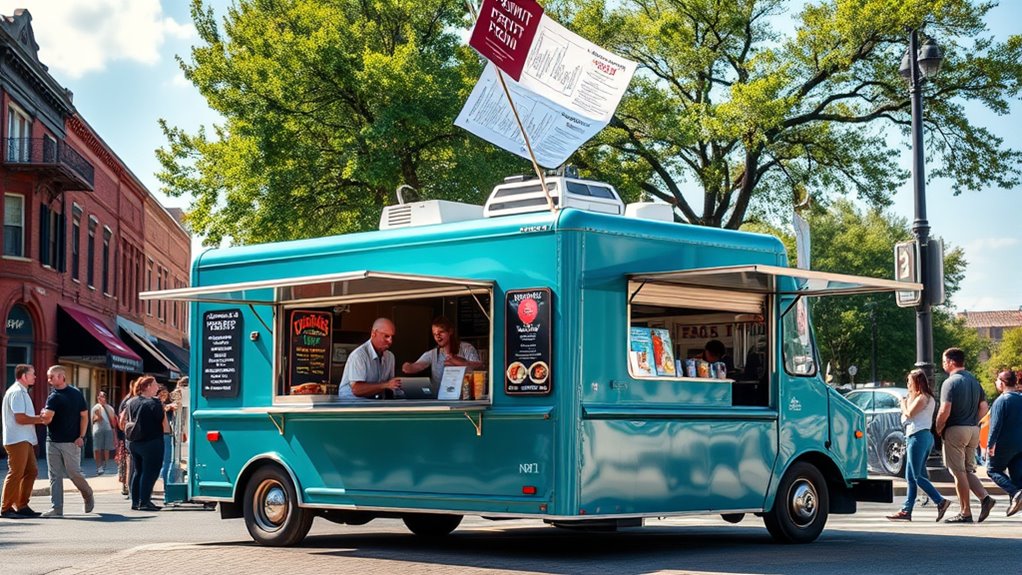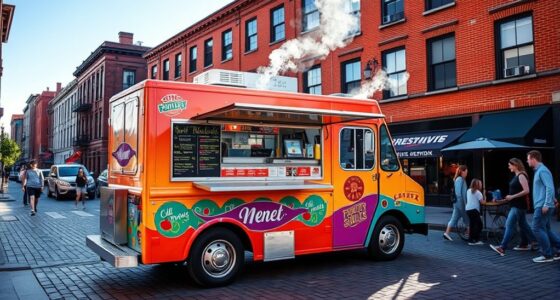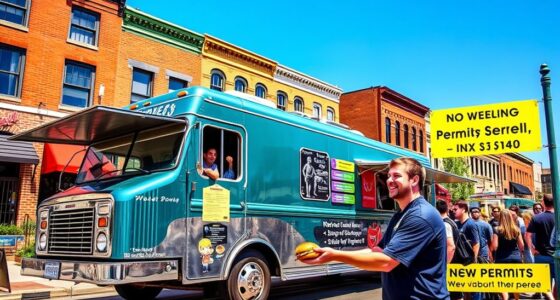To start a food truck in Evansville, Indiana, you’ll need to secure necessary permits like a food service and transient merchant license, which must be renewed annually and displayed on your truck. Budget around $40,000 to $150,000 for your truck and $1,864 to $28,276 for permits. Choose busy locations and peak hours while complying with local regulations. Develop a compliant menu focusing on prepackaged foods, and use social media and local events to attract customers. Keep these steps in mind to set your business up for success as you explore more.
Key Takeaways
- Obtain necessary permits including food, health, and transient merchant licenses, and ensure compliance with Evansville and Indiana regulations.
- Budget $40,000–$150,000 for truck purchase, licensing fees, equipment, and initial inventory; plan for ongoing expenses like fuel and maintenance.
- Choose high-traffic locations such as downtown, festivals, and near entertainment venues, and align operating hours with peak customer times.
- Develop a compliant menu with prepackaged or precooked foods, submit for approval, and incorporate local flavors within safety standards.
- Utilize social media, participate in events, and implement loyalty programs to effectively market your food truck and attract customers.
Navigating the Permitting Process and Licensing Requirements
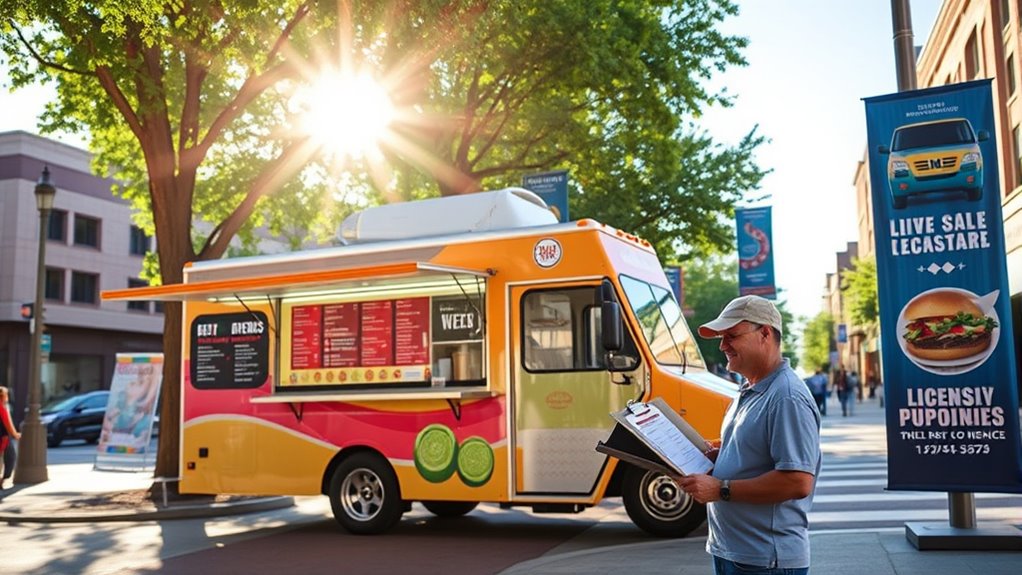
Understanding the permitting process and licensing requirements for a food truck in Evansville can seem complex, but understanding the key steps makes it manageable. First, you need to meet Indiana Food Code standards, including submitting a detailed menu and food safety documents to the Vanderburgh County Health Department before scheduling your opening inspection. Once you pass, your food permit will be issued and must be displayed on your truck; remember, it’s non-transferable and needs renewal every year by March 1. You’ll also need several licenses, including a Vanderburgh County Transient Merchant’s license, Indiana Retail Merchant’s license, and a health department license. Additionally, you must operate at an approved commissary, comply with fire safety inspections, and follow zoning rules. Staying current on all permits and licenses is essential for legal operation. Additionally, you should keep records of all inspections and renewals to ensure continuous compliance with local regulations. Familiarity with food safety standards is crucial, as they are a key aspect of maintaining your permits and ensuring customer trust.
Budgeting for Your Food Truck Business
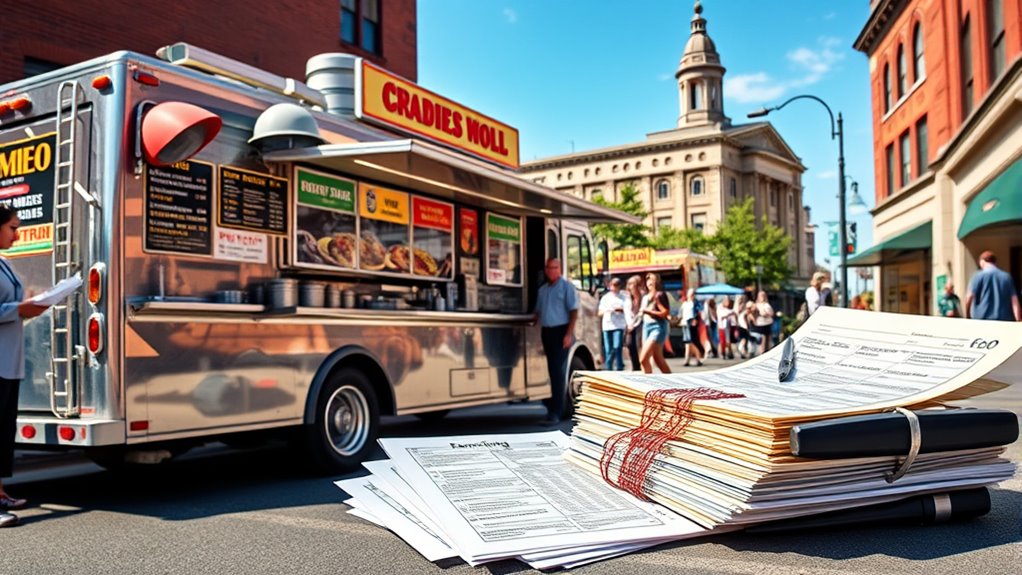
Planning your food truck business requires a clear budget to cover startup costs and ongoing expenses. You’ll need to account for the truck, which can cost between $40,000 and $150,000, depending on whether you buy used or custom-build new. Licenses and permits might range from $1,864 to $28,276, with Indiana falling in the middle. Equipment, kitchen appliances, and initial inventory will add another $4,300 to $8,000 upfront. Expect monthly expenses like fuel, maintenance, staffing, marketing, and insurance. To help visualize, see the table below:
| Startup Costs | Ongoing Expenses |
|---|---|
| Truck purchase: $40K–$150K | Fuel & maintenance: $500–$1K |
| Licenses & permits: $1,864–$28,276 | Inventory replenishment |
| Equipment & appliances: $2,300–$5K | Staff wages & tips |
| Initial food inventory: $2K–$3K | Marketing & advertising |
| Branding & tech setup | Insurance premiums |
Additionally, understanding cost analysis is crucial for maintaining profitability over time.
Choosing the Right Locations and Operating Hours
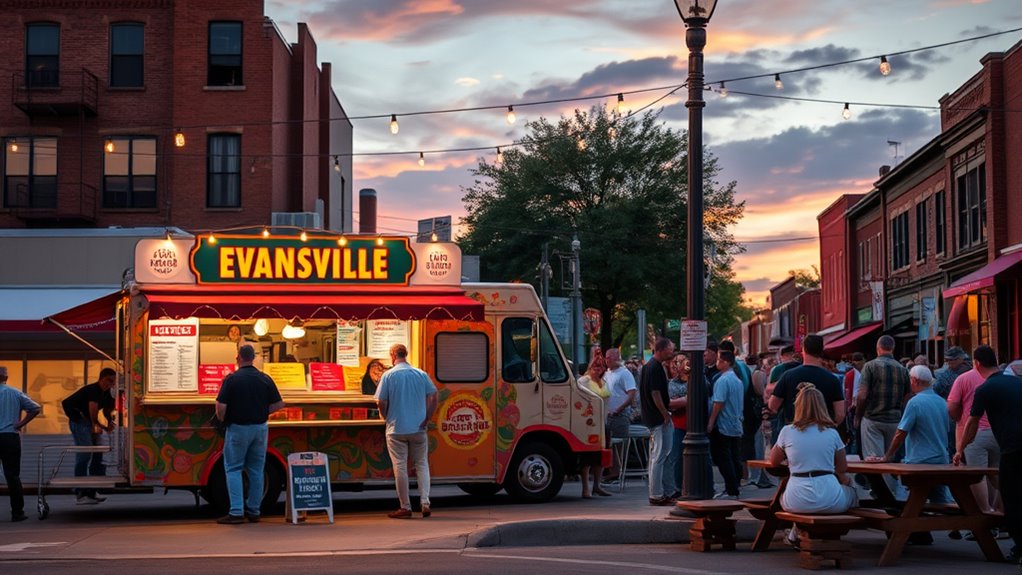
Selecting the right locations and operating hours is essential for maximizing your food truck’s sales and building a loyal customer base in Evansville. Focus on high foot traffic areas like downtown near office buildings and entertainment venues, and consider events such as festivals, sports games, and farmers markets for temporary boosts in sales. Proximity to breweries or parks can also increase visibility. Ensure locations comply with Evansville’s vending regulations, especially within the Downtown Redevelopment Area, and prioritize accessibility and parking for smooth operations. Stick to peak meal times—11 a.m. to 2 p.m. for lunch and 5 p.m. to 8 p.m. for dinner—and consider evening and weekend hours to target leisure crowds. Adjust hours seasonally or for events, always respecting local noise and zoning ordinances. Additionally, understanding the design of a farmhouse bedroom can inspire creative themed setups for food truck interiors or outdoor seating areas, enhancing customer experience.
Developing a Compliant and Appealing Menu
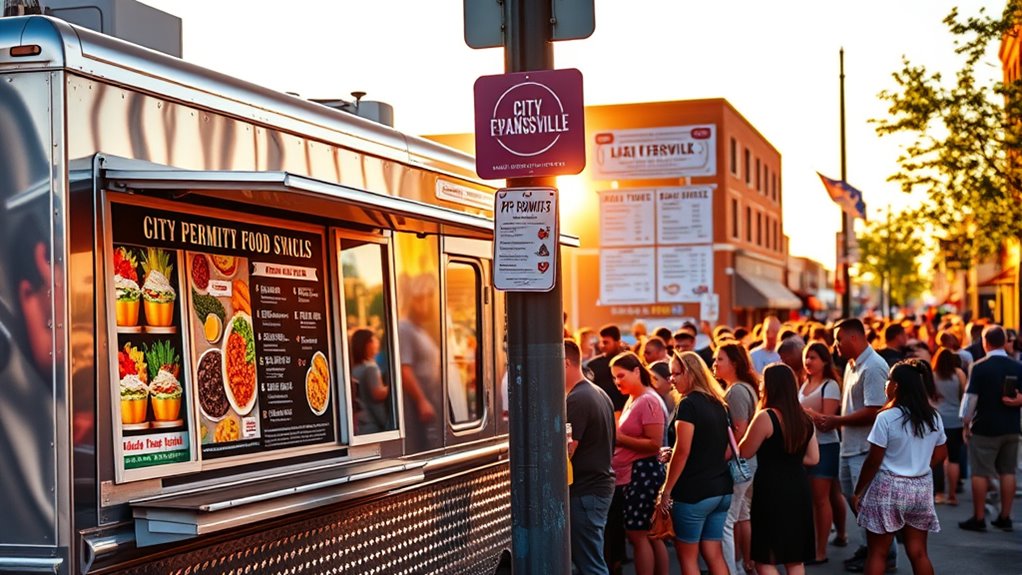
Creating a menu that complies with Evansville’s food safety regulations while still appealing to customers requires careful planning. Focus on prepackaged or precooked foods that are easy to serve and reduce health risks. Avoid raw animal ingredients and limit on-site preparation to reheating commercially prepared items. Keep potentially hazardous condiments and toppings off the menu unless they can be managed within temperature controls. Use accurate thermometers to monitor food temperatures, ensuring safety. Design your menu to minimize handling and assembly, making operations smoother and safer. Include popular local flavors that fit within equipment capabilities. Remember, your menu needs to be submitted for approval before opening, and display prices clearly. A well-planned, compliant menu boosts customer satisfaction and keeps you within food safety standards. The new Food Regulation Law should streamline approval processes, making it easier for vendors to launch and modify menus efficiently.
Effective Marketing and Customer Engagement Strategies
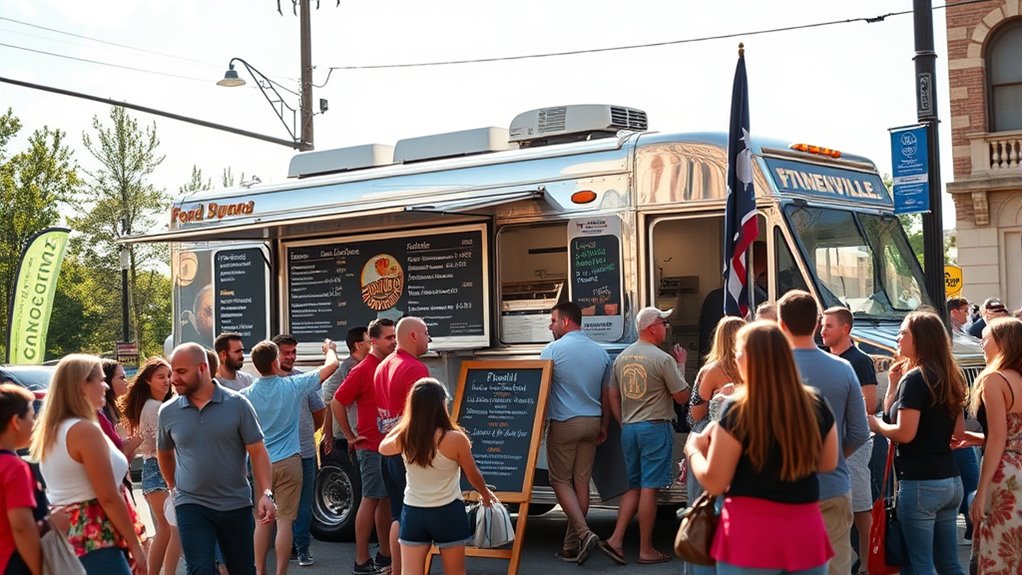
To maximize your food truck’s visibility and build a loyal customer base, leveraging effective marketing and engagement strategies is essential. Using social media platforms like Facebook, Instagram, and TikTok helps you reach local audiences, with 68% of food truck owners actively posting. Engaging content and targeted ads can boost sales by around 20%, and customers tend to spend 15% more when your social media presence is active. Participating in local festivals and events increases brand awareness and provides direct customer interaction, which encourages word-of-mouth growth. Loyalty programs, discounts, and personalized offers keep customers coming back, boosting repeat visits by 30%. Additionally, utilizing GPS and data analytics helps you target nearby customers, optimize schedules, and refine your marketing efforts for better results. Over 24,000 food trucks operate in the United States as of 2023, highlighting the importance of standing out through strategic marketing efforts to capture a share of this growing industry. Regularly checking for up-to-date permits and regulations ensures your business remains compliant and avoids potential fines or closures.
Ensuring Compliance and Preparing for Inspections
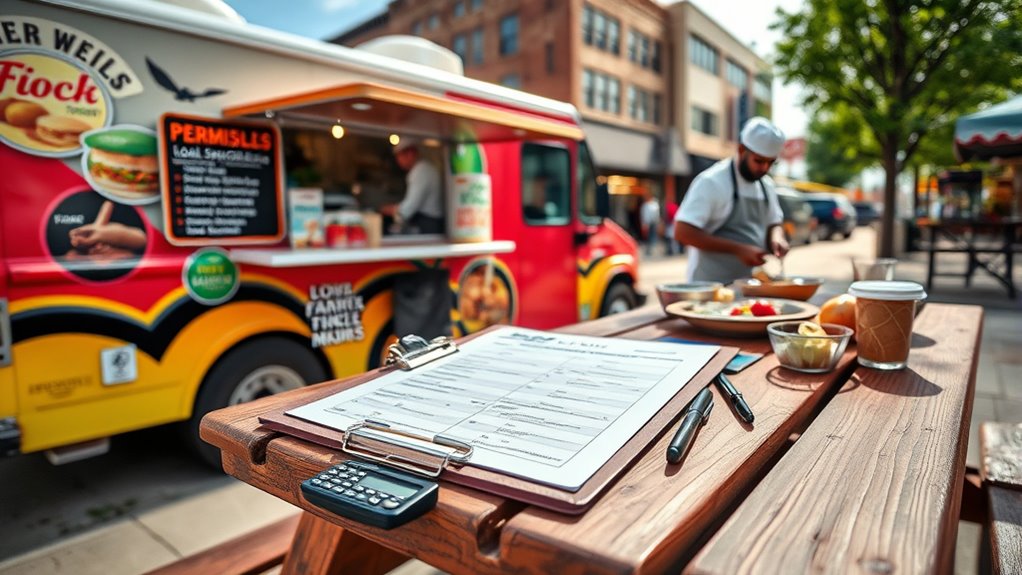
Preparing your food truck for inspections involves understanding and adhering to local health regulations and ensuring all permits and paperwork are up to date. You must obtain a final health inspection from the Vanderburgh County Health Department before starting operations. Display your food service permit prominently on your vehicle, and remember it needs renewal every year. Submit a detailed application with your menu for evaluation, and keep your permit and Commissary Agreement current. Your truck must meet water, sewer, and grease trap standards. Operate from an approved, licensed commissary, and keep records of grease trap maintenance logs. Ensure your staff has certified food safety training, and a knowledgeable person-in-charge is present during all hours. Regularly inspect and maintain your vehicle to meet health standards and prepare for smooth, successful inspections. Additionally, understanding the regulations surrounding glycolic acid can be beneficial if you plan to include skincare products or treatments in your offerings or branding.
Frequently Asked Questions
Can I Operate a Food Truck on Private Residential Property in Evansville?
You can’t operate a food truck on private residential property in Evansville. The city’s regulations prohibit food preparation, storage, or service at private homes. You need to use an approved commissary for all operations. This means you must pass health inspections and obtain the proper permits before starting. Operating on private property without these permits or outside designated areas can lead to fines or permit revocation, so follow the rules closely.
What Types of Insurance Are Required for Food Truck Permits?
You’ll want to make sure your food truck is protected by the right insurance types. Think of general liability insurance as a shield against slips, allergic reactions, or property damage. Commercial auto insurance keeps your vehicle covered on bustling streets. Consider products coverage for food-related claims and inland marine insurance for portable equipment. These essentials help you meet permit requirements and keep your mobile business safe and compliant.
Are There Restrictions on Selling Alcohol From a Food Truck?
You can sell alcohol from a food truck in Indiana, but there are strict restrictions. You need a valid liquor license, and your truck must meet health and safety standards. You must serve food continuously when selling alcohol, avoid serving minors or intoxicated customers, and only sell alcohol in designated areas. Additionally, alcohol sales are limited by local laws, and you’ll need to partner with a licensed commissary to stay compliant.
How Do I Find Approved Commissaries in Evansville?
Think of finding an approved commissary in Evansville as searching for a trusted harbor for your food truck. You should contact the Vanderburgh County Health Department at (812) 435-2400 or email health@vanderburghcounty.in.gov. They’ll provide a list of licensed facilities like Kitchen 812 that meet all health and utility standards. Always verify approval and complete your annual commissary agreement to keep your operations smooth and compliant.
What Are the Penalties for Non-Compliance With Health Codes?
If you don’t follow health codes, you face serious penalties. You could get a Class A infraction or misdemeanor, which means fines or even criminal charges. Your food truck might be impounded, and you’ll need to pay disposal and impound fees before you can operate again. Law enforcement can detain your vehicle for inspection anytime, and failing inspections can lead to permit revocation and additional legal consequences.
Conclusion
Starting your food truck in Evansville might feel like a mountain to climb, but with the right planning, you’ll conquer it effortlessly. Keep up with permits, budget wisely, choose prime locations, craft a mouthwatering menu, and engage your customers confidently. Remember, your food truck can become the heartbeat of Evansville’s vibrant street scene—so don’t hold back! With dedication and smart strategies, you’re on your way to turning your food truck dream into a delicious reality.
